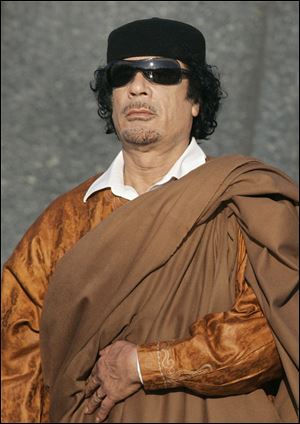
Orders issued for arrests of Gadhafi, son
Airstrikes hit compound as NATO turns up heat
5/17/2011
Moammar Gadhafi is named in an arrest warrant for crimes against humanity.
TRIPOLI, Libya — Airstrikes and arrest warrants put negotiations in Libya ever further out of reach Monday, as massive explosions rocked Moammar Gadhafi’s compound just hours after international prosecutors said he, his son, and his intelligence chief had committed crimes against humanity.
The bombs that thundered across Tripoli Monday night reflected NATO’s resolve to strike targets closer to the Libyan leader himself.
The legal accusations narrowed the range of figures inside the Libyan government who could credibly make a deal with the forces that oppose Gadhafi, analysts said.
Prosecutors in The Hague said Monday that they had collected enough evidence to request arrest warrants for Gadhafi, his British-educated son Seif al-Islam Gadhafi, and his intelligence chief, Abdullah al-Senussi.
But an arrest warrant may have little immediate effect on Gadhafi’s movements or power.
An arrest warrant for Sudanese President Omar Hassan al-Bashir was issued in 2009, and he remains his country’s head of state. Mr. Bashir has visited other African countries since the warrant was issued — including some that have signed on to the International Criminal Court — but has not been arrested.
The prosecutors’ announcement came a day after Britain’s top military commander called for NATO to expand its military campaign to prevent a stalemate. Gen. David Richards told the Sunday Telegraph he wanted to increase the range of targets NATO could hit.
That threat seemed to unsettle Libya’s government. It announced the country’s telecommunications workers and their families — 45,000 men, women and children in all — had volunteered to serve as human shields to protect key infrastructure from bombing. It was impossible to verify the claim.
The legal proceedings against the three officials likely eliminated Seif al-Islam Gadhafi as a potential Libyan negotiating partner, analysts said.
Before protests and rebellion erupted in Libya in February, the son had been seen by many in the West as the best hope for reform in Libya. Fluent in English and trained at the London School of Economics, he socialized with Britain’s high society.
But many of Libya’s rebels and Western officials saw him in a new light after he gave two bellicose speeches in the protest’s early days.
The request for an arrest warrant validates “the idea that Seif has made the transformation from being a reformer to being in it up to his knees,” said Shashank Joshi, an associate fellow of Britain’s Royal United Services Institute, a think tank.
Libya, which has not signed the International Criminal Court treaty, said before the prosecutors’ announcement that it would ignore any warrants that were issued.
“We will not show much attention to the decision,” said Deputy Foreign Minister Khaled Kaim, alleging that the court — which has carried out most of its work in Africa — unfairly targets leaders on that continent. The court “is a baby for the European Union,” he added.
The request for arrest warrants, accompanied by a 74-page dossier detailing the alleged crimes, was bolstered by information from “high-level officials in Gadhafi’s regime” who contacted The Hague in the past week, prosecutors said.
The warrants, which still need to be approved by the court, would mean the three officials could be arrested in any country that has signed on to the court treaty.
“The evidence shows that Moammar Gadhafi personally ordered attacks on unarmed Libyan civilians,” chief prosecutor Luis Moreno-Ocampo said. “We have such strong evidence, direct evidence of their involvement in the crimes.” He called Mr. Senussi an “executioner.”
The White House welcomed the prosecutors’ action, which it said was part of a larger international effort to ensure that Gadhafi and his allies are held accountable for attacks on civilians.
“The actions of the security forces and the Gadhafi regime that have been highlighted by the prosecutor underscore the gravity of what we are witnessing in Libya today,” National Security Council spokesman Tommy Vietor said. “As new reports emerge that the Gadhafi regime continues to directly target civilians, it is clear that the need for justice and accountability persists.”